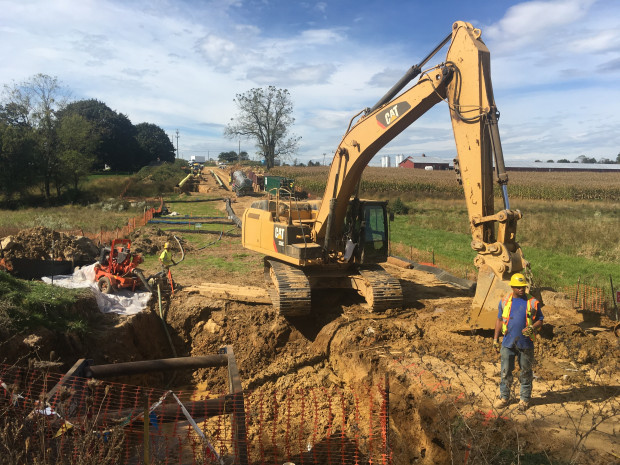
Workers build a new pipeline in Susquehanna County, Pa.
Kim Paynter / WHYY/Newsworks.org


Workers build a new pipeline in Susquehanna County, Pa.
Kim Paynter / WHYY/Newsworks.org

Kim Paynter / WHYY/Newsworks.org
Workers build a new pipeline in Susquehanna County, Pa.

Jon Hurdle / StateImpact PA
A Mariner East 2 construction site in rural Pennsylvania. The Public Utility Commission lifted a ban on construction of a valve, removing one obstacle to completion of the project.
Pennsylvania’s Public Utility Commission dropped an injunction against the construction of a Mariner East 2 pipeline valve on a private site in Chester County’s West Goshen Township after Sunoco said it no longer planned to build the valve there.
The commission voted 3-2 on Thursday to end the construction ban it imposed in October after finding that Sunoco had violated a 2015 settlement agreement with the township over where the valve could be built. The regulator had scheduled a full hearing on the matter in April 2018.
“Because Sunoco has stated on the record that it will not construct the valve within the township, the specific action from which Sunoco was enjoined is moot,” wrote commissioner Norman Kennard, who voted in the majority.
The PUC’s decision lifts one obstacle to the completion of the cross-state pipeline project, which has been repeatedly delayed by drilling mud spills and by a court order, and faces opposition from affected communities and some lawmakers.
Even though Sunoco has said it won’t build the valve anywhere in the township, the municipality is continuing its legal case against the company because it wants the valve to be built in the company’s “use area,” a site specified by the settlement agreement, said Richard Sokorai, an attorney for the township.
Equipment there would help to control any release of highly volatile natural gas liquids if there is a leak, Sokorai said.
Critics of the pipeline argue that it will expose communities, especially in the densely populated western suburbs of Philadelphia, to the risk of a major explosion if there is a leak.
“The agreement says they will put a valve at the use area,” Sokorai said. “We have no idea what their plan is now. Are they just eliminating the valve completely? They didn’t come forward to the PUC and say ‘Here’s our new plan.’”
PUC chairman Gladys Brown agreed the case is not settled, and dissented from the decision to drop the injunction.
“The parties have not settled this case, the Township has clearly expressed its intent to continue to pursue this action, and contested issues remain before the Commission,” she wrote in a statement after the meeting.
Sunoco spokesman Jeff Shields said safety is built into federal regulations on the construction and operation of pipelines.
“It is well documented that we exceed those federal safety regulations in many areas, including pipe thickness, depth, weld testing and pipeline inspection,” he wrote in an email.
Kurt Knaus, a spokesman for the PA Alliance for Energy, which represents the industry, welcomed the PUC’s ruling.
“This outcome is good news for residents and businesses across Pennsylvania who are waiting for the additional benefits that this project will bring once it’s up and running,” Knaus said in a statement.
The $2.5 billion pipeline is scheduled for completion in the second quarter of 2018. It will carry ethane, propane and butane some 350 miles from the Marcellus Shale of southwest Pennsylvania to a terminal at Marcus Hook near Philadelphia, where most of the material will be exported for use in plastics production.
StateImpact Pennsylvania is a collaboration among WITF, WHYY, and the Allegheny Front. Reporters Reid Frazier, Rachel McDevitt and Susan Phillips cover the commonwealth’s energy economy. Read their reports on this site, and hear them on public radio stations across Pennsylvania.
(listed by story count)
StateImpact Pennsylvania is a collaboration among WITF, WHYY, and the Allegheny Front. Reporters Reid Frazier, Rachel McDevitt and Susan Phillips cover the commonwealth’s energy economy. Read their reports on this site, and hear them on public radio stations across Pennsylvania.
Climate Solutions, a collaboration of news organizations, educational institutions and a theater company, uses engagement, education and storytelling to help central Pennsylvanians toward climate change literacy, resilience and adaptation. Our work will amplify how people are finding solutions to the challenges presented by a warming world.